Cheetos Puffs (History, Flavors & Commercials)
Cheetos Puffs, those airy, crunchy, cheesy treats that melt in your mouth and leave their mark on your fingertips, first hit the chip aisle in 1971. But their origin story begins much sooner, with Crunchy Chee-tos, which were introduced to the world in 1948. Fifty years later, the company dropped the hyphen in the name but kept the same delicious taste.
Cheetos Puffs and Crunchy Cheetos were the brainchild of Charles Elmer Doolin, who had previously come up with the winning snack food Fritos. Eventually, Doolin joined forces with H.W. Lay and Company, and the hugely successful Frito-Lay empire was born in 1961. Just four years later, Frito-Lay became a part of the Pepsi-Cola Company, now PepsiCo.
Please leave a review or any memories of this snack in the comments at the bottom of this page. Thank you!
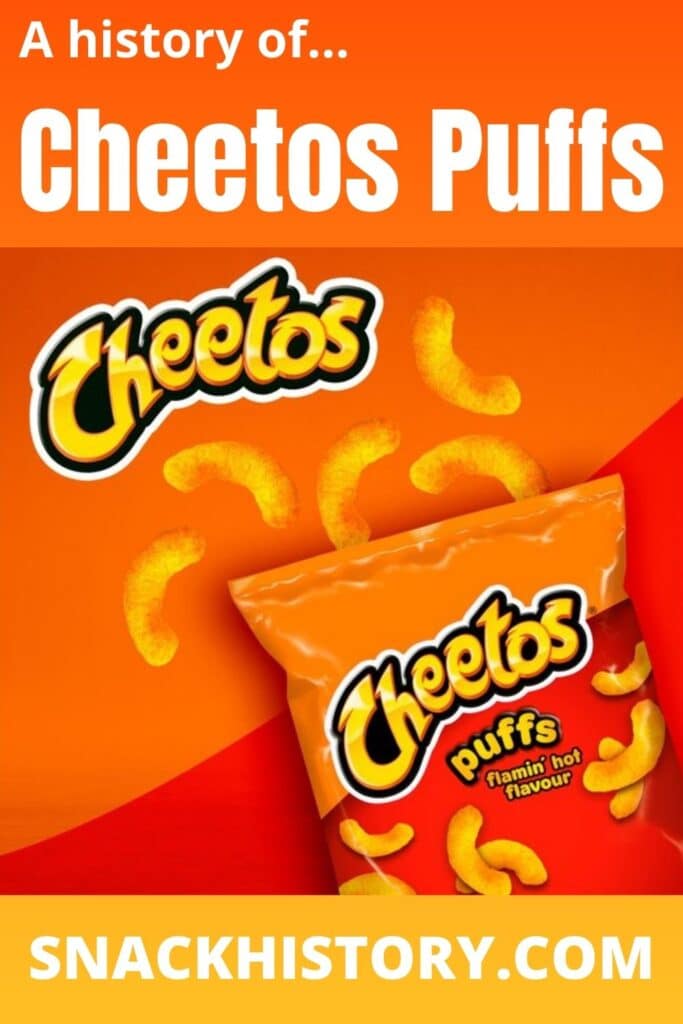
How Are Cheetos Puffs Made?
The base for Cheetos Puffs is made from two simple ingredients: cornmeal and water. But not just any cornmeal: The cornmeal used for Cheetos Puffs is carefully chosen to ensure that the texture is super fine and that the moisture content is low. These are essential to providing the right texture and puffiness.
Once the cornmeal and water are mixed to the desired consistency, the dough is quickly extracted and loaded into something called an extruding machine. That machine exposes the dough to heat, moisture and pressure.
Then the dough makes its way through the extrusion chamber, where it gets steamed and exposed to high and low pressure, which makes it puff. Eventually the dough takes shape: Into snake-like tubes called “collettes.”
The collettes are cut to size and dried out in a large oven. Next, they are sprayed with vegetable oil and dusted with their flavoring (can you say cheese?) and seasonings and tumbled to be sure they are perfectly oiled and coated. They dry out again and then finally make it to packaging, distribution and eventually into your hands.
Speaking of hands, there’s a name for the dust that sticks to your fingers when you are eating Cheetos Puffs. It’s called “cheetle.”
Flavors
Cheetos Puffs come in quite a few varieties. Some, like Flamin’ Hot Cheetos Puffs, are extremely popular. Others have not exactly been such hot commodities and have been discontinued.
Available in stores
- Cheetos Puffs. These are the classic puffs with a smooth, slightly bended shape. They are light, airy and covered in cheese.
- Cheetos Puffs Flamin’ Hot are a darker orange, much spicier version of the classic variety.
- Cheetos Paws have made a comeback and are for people who like their puffs to have a more feline appearance but to have the same taste as their original variety.
- Cheetos White Cheddar Bites are for those who prefer their cheddar to be sharp, delicious and much less orange.
Discontinued flavors
Here’s a list of some of the discontinued flavors.
- Cheetos Pizza Puffs hit the market in 2001 and were discontinued in 2006.
- Cheetos Paws were introduced in 1990 and are basically Cheetos Puffs shaped like cat paws. While not available on their own for awhile they are back on the market and can be found in some snack mixes.
- Cheetos X’s and O’s only lasted a year, and that year was 1999.
- Cheetos Twisted puffs were a bit bigger and thicker than the standard Cheetos Puffs, and they had a corkscrew shape. They were available for about 10 years, from 2002 to 2012.
- Honey BBQ Cheetos Puffs were brought to market in 2011 and are no longer available today.
All told, including all the 21 different types of Cheetos that have been sold in North America over the years, Cheetos has been ranked as the top-selling brand of cheese puffs, with annual sales as much as $4 billion. Cheetos are sold around the world, and some countries offer flavors made with regional flair, such as the strawberry Cheetos Puffs sold in Japan.
Flamin’ Hot origin story
For more than a decade, the story of how Flamin’ Hot Cheetos and Flamin’ Hot Cheetos Puffs was the stuff of movies: A janitor working for Frito-Lay has a brilliant idea. That idea was to spice up the classic Cheetos Puffs by adding a Latin flair, adding chile to make a spicier, deep red treat to rival the competition.
The janitor’s idea is met with some resistance, but nonetheless the flavor gets made, and the janitor rises in the company, eventually becoming a director and overseeing areas that included marketing and new product development.
As this tale became more and more public and eventually was greenlit as a movie involving Eva Longoria, the story started to crumble. Frito-Lay calls it an urban legend. The company did an internal investigation and revealed that the Flamin’ Hot Cheetos were tested years before the janitor, whose name is Richard Montañez, began working for the company. While Frito-Lay is careful not to diminish Montañez’s overall contributions to the company, they do insist the Flamin’ Hot Cheetos story just isn’t true.
Who really invented the Flamin’ Hot Cheetos Puffs?
The story is more typical corporate team and less unknown underdog dream. A team of snack food pros who worked for Frito-Lay came up with Flamin’ Hot Cheetos Puffs in 1989 as a way to compete with spicy snacks that were a hit in inner cities. The “Flamin’ Hot” name is credited to a young employee named Lynne Greenfeld.
When she heard the story Montañez was telling at speaking engagements and then his own book, she raised doubts. Her questions are what led to the Frito-Lay investigation and the denial of Montañez’s claim to fame. Since then, other employees who worked for Frito-Lay when Flamin’ Hot Cheetos Puffs were developed have come forward with stories of their own about their contributions to making the iconic snack.
Logo
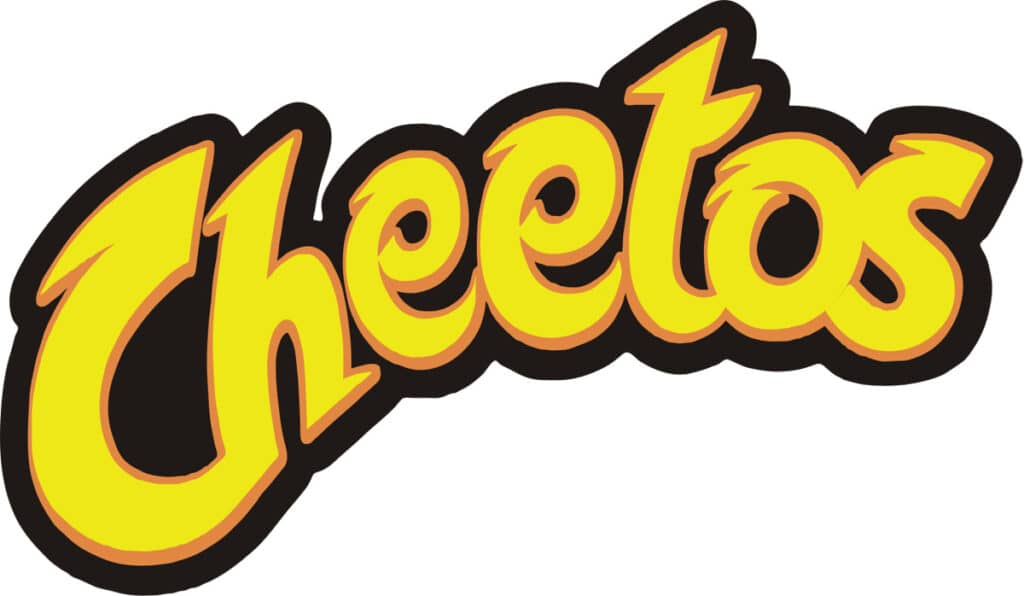
Buy Online

Ingredients
- Enriched Corn Meal
- Corn Meal
- Ferrous Sulfate
- Niacin
- Thiamin Mononitrate
- Riboflavin
- Folic Acid
- Vegetable Oil
- Corn
- Canola and/or Sunflower Oil
- Cheese Seasoning
- Whey
- Cheddar Cheese
- Milk
- Cheese Cultures
- Salt, Enzymes
- Canola Oil
- Maltodextrin Made from Corn
- Natural and Artificial Flavors
- Salt
- Whey Protein Concentrate
- Monosodium Glutamate
- Lactic Acid
- Citric Acid
- Artificial Color Yellow 6
- Salt
Nutrition
| Serving Size: | 13 pieces (28g) | % Daily Value* |
| About 7 Servings Per Container | ||
| As Packaged | ||
| Calories | 160 | |
| Calcium | 0mg | 0% |
| Carbohydrate | 16g | 6% |
| Cholesterol | 0mg | 0% |
| Fat | 10g | 13% |
| Saturated | 1.5 | 8% |
| Trans | 0g | |
| Iron | 0.4mg | 2% |
| Fiber | Less than 1g | 3% |
| Potassium | 60mg | 0% |
| Sodium | 270mg | 12% |
| Protein | 2g | |
| Sugars | 1g | |
| Vitamin D | 0mc | 0% |
- The % Daily Value (DV) tells you how much a nutrient in a serving of food contributes to a daily diet. 2,000 calories a day is used for general nutrition advice.
Selling Cheetos Puffs
Cheetos debuted their first mascot in 1971. The character was an animated mouse who spoke with a formal accent and wore a three-suit. His slogans included, “Chee-tos. Cheese that goes crunch!” and “Hail Chee-sar!” The Cheetos Mouse appeared in commercials and other advertisements for about eight years, before it was retired.
In 1986, Chester Cheetah became the mascot for Cheetos Puffs. Unlike his slightly uptight mouse predecessor, Chester was designed as smooth-talking, sometimes trouble-making character. His slogans included “The cheese that goes crunch!” and “It ain’t easy bein’ cheesy” from the mid-1980s to the mid-1990s. His signature slogan became “Dangerously cheesy” in 1997.
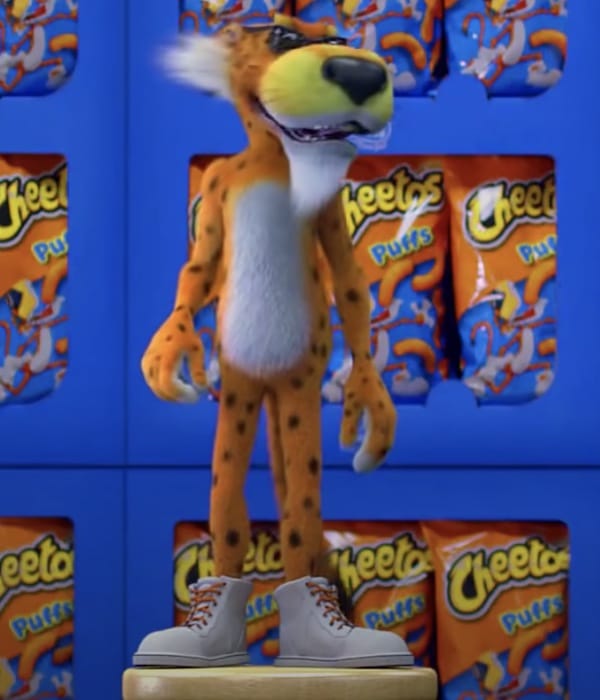
The more cunning Chester started appearing in 2008, when Cheetos Puffs marketing shifted away from a child audience to a more grown-up market. Chester appeared in ads suggesting people use Cheetos to their advantage, making a splash with a Super Bowl commercial where loud, crunchy Cheetos interrupt an obnoxious person chatting on a cell phone at a restaurant. This sly, more conniving version of Chester is used to advertise Cheetos Puffs today.
Famous fans
Just when we thought celebrities were different than the rest of us, we learn that they are just as susceptible to the lure of a crunchy, airy, cheesy treat.
The list of celebrities who have shared their love for Cheetos Puffs includes Kim Kardashian, Selena Gomez, Rihanna, Britney Spears, Katy Perry, who dressed as a Cheetos Puff for Halloween), Madonna, Iggy Azalea and Kylie Jenner.
Cheetos Puffs: Not just for eating
Cheetos Puffs attract attention beyond the grocery store shelves and celebrity cravings.
In 2017, one Cheetos Puff – a Flamin’ Hot variety— was purportedly worth a whopping $99,000. Why so much? The Cheetos Puffs snack looked like the Internet-famous gorilla Harambe, whose story became famous after he was shot and killed in the Cincinnati Zoo. As it turned out, the buyer who offered the $99,000 for the Cheetos Puff backed out of the sale. The story made headlines, and was featured on late-night TV nonetheless.
Another Cheetos Puffs story that grabbed attention was a creation by Orlando artist Mateo Blanco, who created a cheetah statue using nothing by Cheetos snacks and glue. Blanco carefully sliced Cheetos Puffs to use for the sculpture and used makeup brushes to contour the crevices and add dimension to his creation.
Pictures
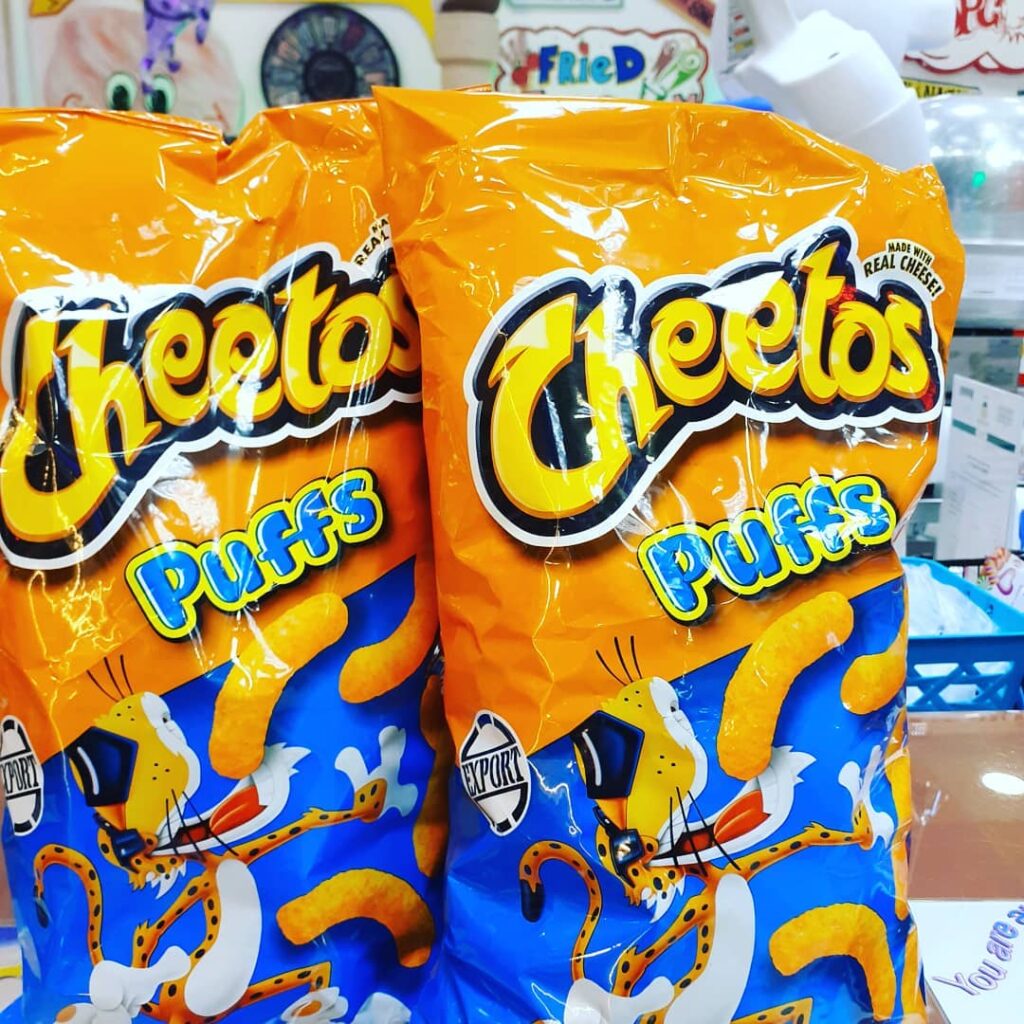
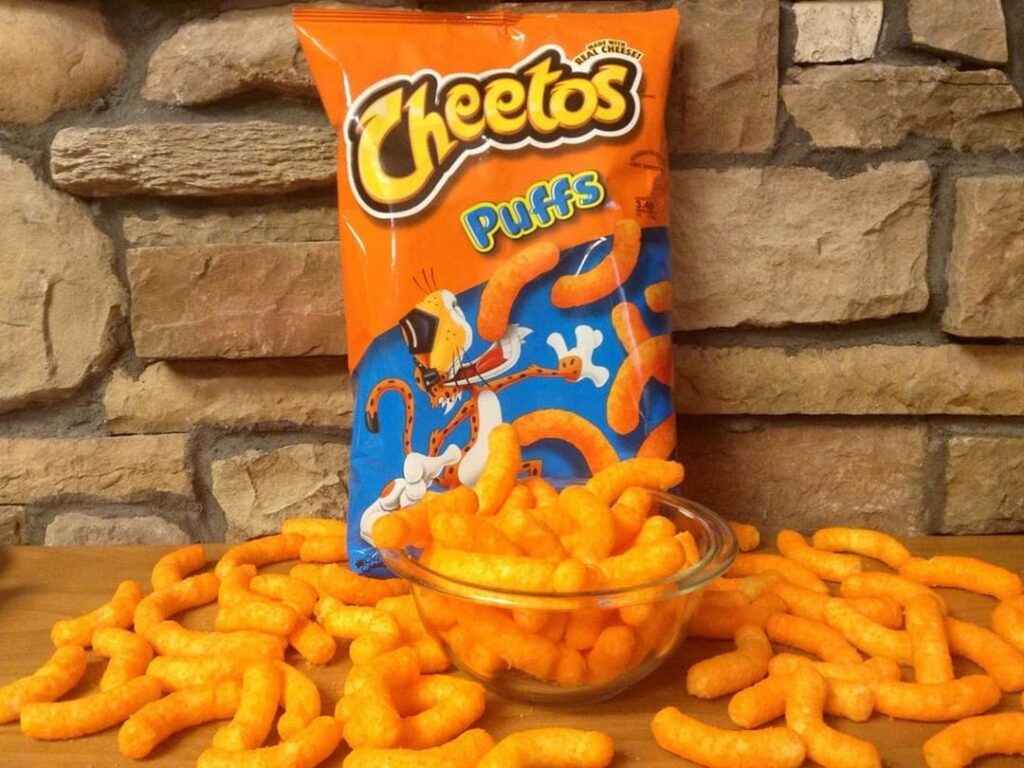
Commercials
Facts
- In 2017, Frito-Lay opened a pop-up restaurant in New York that featured dishes made with Cheetos Puffs. The menu items sold out quickly, and the endeavor was deemed a great success.
- The name Cheetos was inspired by the name Fritos, a cheese-less yet hugely popular snack item.
- To make a year’s worth of Cheetos Puffs, Frito-Lay needs 11 million gallons of milk, which translates to 10 million pounds of cheddar cheese. How many cows do you need for this production every year? About 5,000, with each producing about 2,200 gallons of milk.
- In 2001, Cheetos Puffs were designed to leave a color residue on the tongue as well as the fingers. The long-since discontinued Cheetos Puffs contained an element that would randomly turn the eater’s tongue blue or green.
- A massive Cheetos Puff once garnered bids of over $1 million on eBay before the auction site shut the item down because of fraudulent bids. The person who found the giant Cheeto ended up donating it to a town in Iowa, which turned the puff into a tourist attraction.
FAQ
How are Cheetos Puffs made?
The first step in the process is mixing cornmeal with water, which creates a batter. The batter then passes through an extruder, which gives Cheetos their unique shape. At this point, the snack has the yellow color and consistency of a rice cake.
The uncooked Cheetos then pass through a fryer, where they are cooked at a temperature higher than 300 degrees. After this, comes the cheese.
Powdered cheddar cheese is mixed with oil and other seasonings and then applied to the Cheetos, giving them the taste we all know and love and their distinct bright orange color.

My name is Brianna and I love writing on all topics. Candy history fascinates me and I am passionate about sharing my love of this topic with everyone else!
Please leave a review or any memories of this snack in the comments below. Thank you!
Click here for a full A-Z list of Snacks and Candy
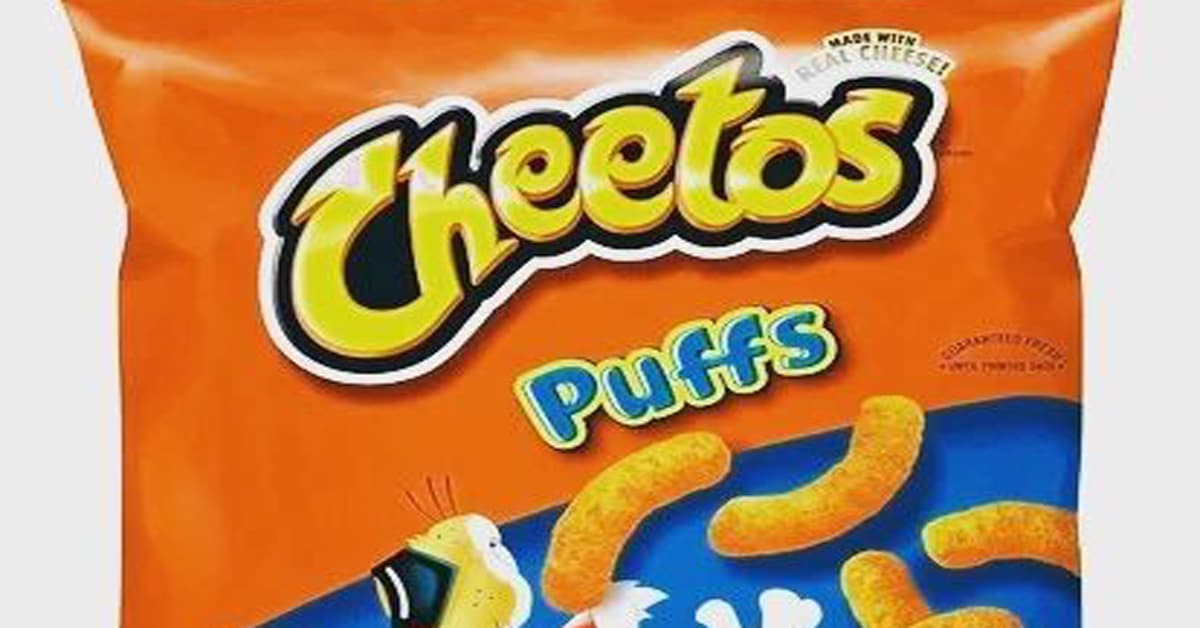
The latest Cheetos Cheese Puffs do not have the same exact texture and crunch sensation.
What has been changed? I have some smaller bags of cheetos that have the regular feel and taste. The regular ones I could hold between my 2 fingers and my Dog dunkin could lick the cheese off the entire cheeto as I rotated it.
The new cheeto crumbles in my fingers.
I do not like the new change in cheetos.
From someone who used to consume at least 3 family size bags a week.
Crying in Hockley, Texas
Hazel Ford
[email protected]
Can you return to making Cheetos puffs to the original size? The ones on the market now are so thick and fat. We really do prefer the skinny ones.
One more thing,please make the BBQ Fritos available to everyone. I travel up to 15 miles to find them at a neighborhood grocery store. The are hard to find in local retail grocers.